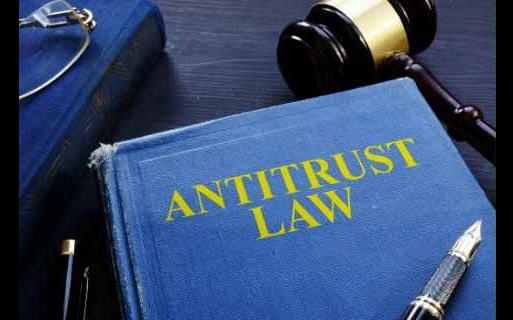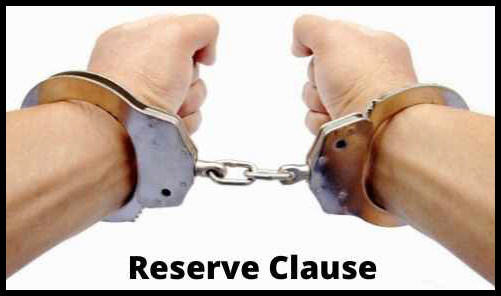Major League Baseball is currently engaged in one of its ugliest labor disputes in decades. In discussions of this battle, we’re commonly hearing references to Major League Baseball’s “antitrust exemption”.
What is Major League Baseball’s antitrust exemption, how did it come about, and will it last?
The Sherman Antitrust Act
To understand baseball’s position, we have to go all way back to 1890.
This was when the Sherman Antitrust Act was enacted. It is still in the United States Code today.

The Act is named for Senator John Sherman of Ohio. Sherman was an expert on trade and economics.
What does the Sherman Antitrust Act prevent?
The Sherman Act is designed to prevent anticompetitive acts in interstate commerce i.e. commercial trade across state lines. It aims to prevent groups or businesses from getting together to make agreements that stop competition.
It prohibits businesses from:
- forming cartels
- fixing prices
- limiting production
- agreeing on territories
Basically, it covers anything that would limit competition or try to gain a monopoly.
Allowing competition
If a business gets a monopoly simply because all its competitors fail, that’s not illegal.
But any actions to preserve the monopoly are.
The purpose of the law isn’t to protect businesses from even the hardest of competition. Instead, it aims to make sure that competition can continue for the benefit of customers.
The underlying belief of all antitrust law is that competition is ultimately good for the consumer.
This is because competition gives a business a strong incentive to put out the best product at the best price possible. If they don’t, their competitor will!
How is the Sherman Antitrust Act enforced?
Enforcement of the Sherman Act can be done in the Federal Courts in two ways.
- The government can bring actions against violators
- Private individuals can take civil suits if they’ve been harmed by violations of the act.
Punishments range from the dissolution of businesses to prison or fines.
Private individuals can be granted triple their damages for a violation of the Act.
The Sherman Act’s reach was subsequently expanded by the Clayton Antitrust Act and the Robinson-Patman Act. However, the Sherman Act is still the primary antitrust law in the United States.
How Baseball Got Its Antitrust Exemption

There’s a common misconception that Major League Baseball was granted its antitrust exemption by Congress, but this isn’t the case. It was entirely due to a Supreme Court decision in 1922.
We’re going to step through the sequence of events that led to the exemption. Let’s start back in the early twentieth century.
Before 1914, there were two major leagues for baseball: the American and National Leagues.
In 1914/15, the Federal League was formed to try and become a third major league for baseball. The participant clubs wanted to compete for fans and baseball players.
However, the new competition struggled to gain traction and the Federal League filed suit in 1915. They cited Sherman Act violations due to monopolistic actions by the other leagues.
The Judge Who Did Nothing (And Became Commissioner)
The case was in front of Federal Judge Kenesaw Mountain Landis. He later became the first commissioner of Major League Baseball.
Landis was an avid baseball fan and was very worried about the case. He figured any decision he made would damage the entire sport.
So he decided not to make a decision! Landis sat on the case, doing nothing.
This ploy worked. Seven of the eight teams in the Federal League got tired of waiting (or ran out of money). They settled with the Major Leagues and disbanded.
This meant that the lawsuit ended without a decision.
The Unhappy Baltimore Terrapins
However, one of the teams held out. The Baltimore Terrapins weren’t happy with the settlement.
They filed a new Sherman act suit in Federal Court, Federal Baseball Club v. National League. The Terrapins complained that the monopolistic actions of the big leagues had driven them out of business.
Initially, the Terrapins won at the trial level.
However, an appeals court overturned this and the Terrapins took the case to the Supreme Court.

The unanimous decision was written by famed Justice Oliver Wendell Holmes, Jr.
The Supreme Court held that the Sherman Act didn’t apply to Major League Baseball.
This decision created Baseball’s antitrust exemption.
You can find the case details at Federal Baseball Club v. National League.
Why Did The Supreme Court Make Baseball Exempt?
The Supreme Court reasoned that the Sherman Act didn’t apply because the games were not interstate commerce.
“Interstate” means crossing state lines. This has to be the case for the Sherman Act to get involved.
The Supreme Court said that each baseball game took place entirely inside a single state. If the game was played in Vermont, it was entirely in Vermont, and therefore a Vermont matter.
Using this analysis, the only way for the Sherman Act to apply was if the home plate was in New York and first base in Vermont!
Isn’t this ruling crazy?
The ruling seems crazy to us now. Baseball is clearly a business that crosses state lines. Even in the earliest days, people traveled across state boundaries to attend games.
And of course, broadcasts beamed the matches throughout the country and beyond.
How on earth could the top judges come to this conclusion?
It made sense at the time
The decision does make sense in the context of its times. In the 1920s, the definition of “interstate commerce” was much narrower than it is now.
“Interstate commerce” was thought to be tangible products that were made in one state and then transported to another.
A baseball game wasn’t looked at as a product because it’s not a tangible thing that you can throw on a train and ship to Ohio.
In our day and age of digital products available everywhere, it doesn’t make sense. But those were different times.
Challenging Baseball’s Exemption: Flood V. Kuhn
Curt Flood was a Major League Baseball player who signed with the Cincinnati Reds in 1956. He was traded the following year to the St. Louis Cardinals.
Flood played with the Cardinals until 1969 when he was traded to Philadelphia.
Flood refused to go.
The reserve clause
At that time, MLB had a reserve clause. This meant that even after a player’s contract with a team expired, he couldn’t negotiate a new contract with another team. The only way to get a new club was if the team that held his rights traded him.

A player was owned by the first team he signed with for his entire career unless they traded him to another team. That next team then owned him.
Invoking the Sherman Act again
Flood wrote a letter to Baseball Commissioner Kuhn demanding that he be allowed to be a free agent and negotiate with other teams.
Kuhn refused to let this happen.
Flood then filed a federal lawsuit against both Kuhn and Major League Baseball. He claimed that the reserve system was an impermissible restraint under the Sherman Act.
Ultimately, the Supreme Court ruled against Flood in 1972.
Kicking the decision to Congress
The top judges relied on the principle of stare decisis. “Stare decisis” means that if the courts have already decided something in a previous case, the current judges are bound to stick by that decision.
The Supreme Court Judges in 1972 admitted that their decision was inconsistent with other antitrust decisions. However, they decided not to do anything about it.
Instead, they said it was up to Congress to change the laws.
Kicking the reserve clause out of the game
There’s no doubt that many commentators found the reserve clause to be offensive in terms of permanent “ownership” of these players. Even the Supreme Court had been uncomfortable about it.
The reserve clause was actually done away with in 1975. This allowed for free agents after contracts had expired.
This was achieved through arbitration and agreement between the clubs and the players’ associations.
The Curt Flood Act
As we mentioned, the Supreme Court had said in 1972 that Congress should deal with the issues that Curt Flood’s case had thrown up.
It only took Congress twenty-six years to get around to it. Should we say better late than never? Not really!
In 1998, Congress passed the Curt Flood Act. This removed a very small part of Baseball’s antitrust exemption. The Act only dealt with aspects of labor relations with players.
Otherwise, baseball’s broad Antitrust exemption still exists.
Why Don’t Other Sports Have The Same Exemption?
The NFL doesn’t have the same exemption as Major League Baseball. Why not?
There’s a simple reason for this.
It’s all about timing!
No other major sport got involved in an antitrust lawsuit during the period when there was such a limited definition of interstate commerce. We’re talking back in the 1920s.
Since the NFL didn’t take a case back then, they don’t have a decision saying they are exempt from the Sherman Act.
When antitrust suits were taken later against the NFL and other sports, this was at a time when the definition of “interstate commerce” had expanded.
No judge could argue now that a game between the Patriots and the Cardinals doesn’t involve commerce across state lines. In other words, the Sherman Act applies!
Baseball got lucky (from the point of view of the franchise owners) because the Baltimore Terrapins sued (and lost) back in 1922.
Is The Exemption About To Be Shelved?
Baseball’s antitrust exemption has survived numerous lawsuits and bills introduced into Congress in an attempt to eliminate it.
Will it continue forever? Maybe not.
A recent development in the Supreme Court could possibly spell the end for the exemption.
We’ve written a separate article that explains the case of Alston vs NCAA.
I’ll summarize here by saying that the Court showed that it was willing to reverse decades of precedent to find that a sports league is now subject to the Sherman Act when it never was before.
In light of Alston, several minor league baseball clubs have filed a Sherman Act lawsuit against Major League Baseball.
It will be interesting to see if this new Court is willing to throw out the century of precedent that’s given Baseball its exemption.